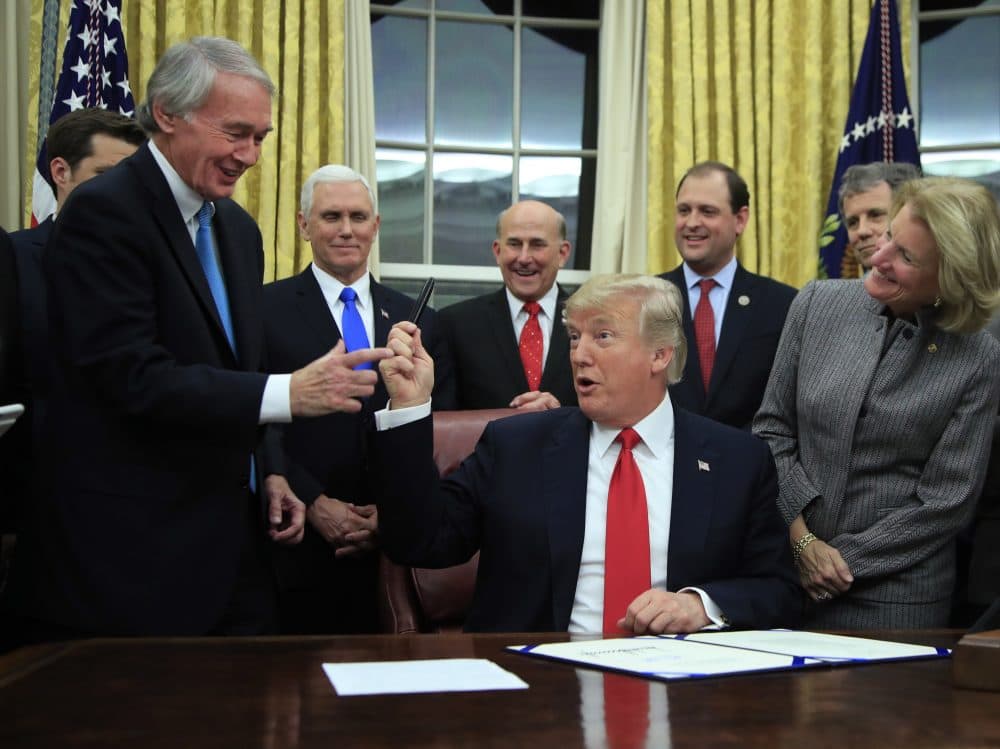Advertisement
Trump Signs Markey Bill To Stem Flow Of Fentanyl

Massachusetts U.S. Sen. Ed Markey and President Trump, who stand firmly on opposite sides of the partisan aisle and the opposite side of most issues on the White House agenda, were side-by-side in the Oval Office Wednesday.
Flanked by Democrat and Republican lawmakers, Trump signed into law a Markey bill that bill that gives border patrol agents extra technology, including chemical screening devices, to help them identify and seize illicit fentanyl before it enters the country.
Calling fentanyl "our new big scourge," Trump described the law — dubbed the INTERDICT Act, for International Narcotics Trafficking Emergency Response by Detecting Incoming Contraband with Technology — as "an important step to halt the flood of deadly drugs that are pouring into our country like never before."
Of the roughly 2,000 people in Massachusetts who died from opioid overdoses in 2016, about 1,700 had fentanyl in their systems, Markey said.
"So this is the epidemic," the Malden Democrat said, according to a White House transcript. "It's gone from prescription drugs to heroin, but it is now a fentanyl epidemic in the country, and the legislation you are signing will give the tools to our law enforcement, to our detection people in the country, to be able to identify it before it gets into the hands of families in our country. So we thank you."
According to the White House, the new law requires U.S. Customs and Border Protection to increase the number of chemical screening devices used to interdict fentanyl and other illegally imported narcotics, and to dedicate personnel to screening and interpreting the devices' data.
It also authorizes the appropriation of $9 million for "hundreds of new screening devices, laboratory equipment, facilities, and personnel for support during all operational hours," Markey's office said.
Trump handed Markey the pen he used to sign the legislation, quipping that giving it to a Democrat "shows you're bipartisan ... and the Republicans told me to give it to a Democrat."
U.S. Rep. Niki Tsongas of Lowell, a lead House sponsor of the bill, told Trump she appreciated "your celebrating this bipartisan moment," but also raised the issue of the changing federal approach to marijuana enforcement. Attorney General Jeff Sessions last week rescinded an Obama-era memo directing federal prosecutors to essentially look the other way in states that had legalized marijuana.
"It's a testament to what can happen for the benefit of the American people when we come together on a scourge such as fentanyl and the opioid addiction," the Democrat said, according to the transcript. "And I encourage you to focus your efforts on further funding and thinking about opioids — and marijuana we can talk about at another time."
"OK. That's OK. That's OK," Trump said, after laughter from the assembled group.
Before signing the bill, Trump reiterated his pledge to build a wall across the country's border with Mexico and touted the importance of customs and border protection, which he called "desperately needed."
"Well, I'm very proud to say that we're way down in the people coming across the border," the president said. "We have fewer people trying to come across because they know it's not going to happen. But we do need the wall, and we need more border security anyway."
The Trump administration on Wednesday also flagged a Republican immigration reform bill as a measure that would help secure the country's borders.
Reps. Bob Goodlatte of Virginia and Michael McCaul of Texas introduced legislation they said "aims to reduce the number of individuals who overstay their visas, requires employers to use the E-Verify system to ensure that they hire legal workers, and makes it easier to remove individuals who are gang members and other criminals."
According to Goodlatte's office, the bill also proposes to crack down on sanctuary cities by withholding federal grants, end the diversity visa program, increase the number of green cards available to skilled workers and create "a new, workable agricultural guestworker program for America's farmers and ranchers." It would authorize construction of a border wall and add new border patrol agents and customs and border protection officers.
"For too long drug smugglers, human traffickers, and transnational gang members like MS-13 have exploited our vulnerabilities at our borders. It's time to end this crisis once and for all," McCaul said in a statement.